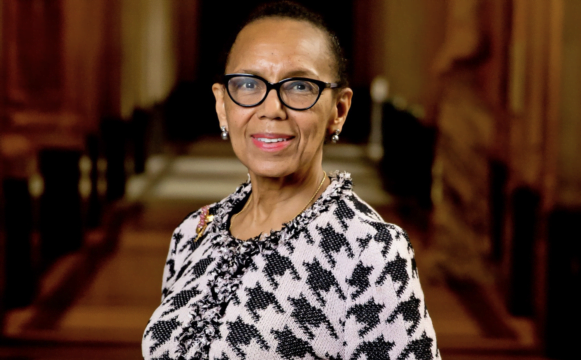
By Allyson Maynard-Gibson, QC
“It is time for a commitment to justice in its broadest sense — as a system that protects those who need it most, that promotes fairness in the economy and that strengthens the bonds which bring us together as a society.” — Justice for All and the Economic Crisis, Pathfinders’ Task Force on Justice
The reform of the Industrial Tribunal has come under the focus of a Legal Affairs Committee (LAC) formed by the National Tripartite Council (NTC). The NTC is to be congratulated for recognizing and acting on this important matter.
Rightly, the report of the LAC presented a history of the tribunal. It should added to that history that the 2017 amendments were added to ensure and emphasize that:
- The proceedings are to be informal, including no wigs or gowns, and that the process is to be more of an inquiry than an adversarial court hearing.
- People may present their own case before the Industrial Tribunal. They do not need to hire a lawyer or anyone else.
- The rules of evidence do not apply to hearings before the Industrial Tribunal. People can present their case in ordinary language and the Industrial Tribunal must listen attentively and make awards based upon what is said to them.
The Pathfinders’ Task Force on Justice in its Briefing Number 2, Justice for All And The Economic Crisis, pointed out that “in pre-coronavirus times, eight percent of people’s legal needs worldwide were related to employment or their businesses.” Post-COVID, this demand has dramatically increased. As is stated by the task force: “Lockdowns have denied many of the world’s 2.1 billion informal sector workers their right to work, increasing their vulnerability to poverty, exploitation and health threats…with the worst impacts falling on the young and marginalized…”
As well as the task force, UNODC, OECD, ILO, the World Justice Project, Open Government Partnership and others are strongly focused on people-centered justice. The task force recommends investment in “personal contact”.
It said: “Formal justice institutions are often complex and intimidating, and most people prefer personal contact over written exchanges. Although face-to-face interaction is limited in almost all countries due to the pandemic, it is still possible to have direct exchanges by phone or online. Justice providers typically rely on documents and written exchanges but dealing with justice problems via direct personal exchanges can lead to more flexible and faster problem-solving. Reaching out by phone before sending out written communications has proven to reduce the number of appeals procedures. In dealing with the fallout from the pandemic, justice systems which invest in phone or online interactions can reduce their workload. Understanding procedures allows people to consider their options and better resolve their problem. Trusted intermediaries, including civil society groups and independent advisors, also have a central role to play in providing user-friendly legal information to those likely to need it.”
In increasing efficiency, the examples of the Netherlands, Ontario and Peru are instructive. They invested in simplified processes and direct personal exchanges to help people understand their rights and options and gave them user-friendly information to help them better resolve their problems.
It is noteworthy that the task force is aligned with Attorney General and Minister of Legal Affairs Carl Bethel, QC, who said that The Bahamas government is committed to ensuring user-friendly information and easy access to the Industrial Tribunal, so that all people in The Bahamas may better resolve their problems. This is especially so in a post-COVID world when the worst impacts have fallen on the young and marginalized.
In examining the recommendations of the LAC, I join with the attorney general in emphasizing the Importance of steering clear of more bureaucracy, greater layers of inefficiency and creating more delays and frustration for taxpayers (including those young and marginalized), who wish simply to have fair, swift and easy access to solutions. More bureaucracy, or moving pieces of a broken system around, does not promote a stronger economy. Onboarding trusted intermediaries, including civil society groups and independent advisors, to promote personal contact (by phone or online) promotes strong justice partnerships, makes room for innovation, creates new jobs, enhances confidence in the system and stimulates the economy.
In examining the LAC’s “Alternatives Available to the NTC”, I join others in suggesting that:
- Transferring the Industrial Tribunal to the Civil Division of the Supreme Court or creating an Industrial Court will fly in the face of the principle that people can represent themselves, informality of hearings, no adherence to rules of evidence, no wigs or gowns, etc. If a janitor from any hotel wishes to be heard by the Industrial Tribunal, he should be able to go to the offices, get assistance from the Industrial Tribunal staff in filing a complaint on a form that he can easily understand and represent himself in an early hearing before the Industrial Tribunal. We all would do well to remember that his taxes are paying the salaries and benefits of the members of the Industrial Tribunal and their staff. All should be ready, willing and able to hear and assist him.
- If there are to be further amendments to the Industrial Relations Act in respect of the Industrial Tribunal, I suggest that a post-COVID world demands investment in personnel to make it easier for ordinary people, whether literate or not, to make complaints and provide for fair and timely hearings and deadlines for awards by the Industrial Tribunal (see the Netherlands example). Further, failure to deliver awards in a timely fashion should be disciplinary grounds for Industrial Tribunal members.
The LAC is to be applauded for suggesting that more focus should be placed on mediation and arbitration.
While many Industrial Tribunal hearings have become similar to Supreme Court hearings, this was never intended and should cease ASAP. The people-centered approach, which is informal, affordable and promotes access to justice, should be mandated and implemented.
Technical legal matters, such as the constitutionality of legislation or legality of a clause in a contract can be heard by the Supreme Court. If parties wish, they may have matters with serious financial implications resolved by arbitration or heard in the Supreme Court.
The task force’s research shows that in a post-COVID world, people need their labor matters fairly and swiftly resolved. This is something that can easily be accomplished in a country as small as The Bahamas. Sustainable development, and the move to common humanity, are accelerated when every person is seen as entitled to people-centered justice. We can be the light on the hill leading the way to more people-centered justice.







